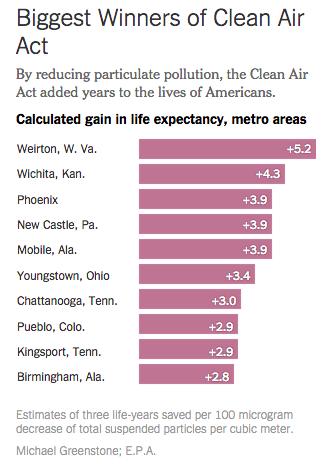Does Clean Air Lead to a Longer Life?
By:
Cleaner air quality is often associated with healthier living—but is that actually the case?
Lots of studies have looked into how less-polluted air affects the humans who breathe it, finding that it decreases the risk of nonfatal heart attacks, improves general respiratory function, and could even be linked to reduced numbers of autism cases, among other things. So what does it do for life expectancy?
New research published in the New York Times offers a glimpse at the improvements cleaner air has made on the lifespans of Americans since 1970, when federal legislation signed into law by President Richard Nixon began curtailing a pollutant-heavy industrial culture, and leading to the creation of the Environmental Protection Agency. The new research suggests that since the Clean Air Act's passage and the subsequent reduction in the amount of airborne particulate matter floating around, numerous U.S. towns and cities have seen significant impacts to residents' life expectancies. (Airborne particulate matter, introduced by things such as car and power plant exhaust. They are generally believed to be the driver of pollutants' harmful effects on humans.)
 New York Times - nytimes.com
New York Times - nytimes.com
As The Times notes, small towns and cities—as opposed to American metropolises such as New York and Chicago—seemed to see greater gains. For example, a child born in the Weirton, West Virginia–Steubenville, Ohio metropolitan area, once a pollution-heavy steel belt hub, has an average lifespan of about five more years than a child born in 1970, according to The Times. On average, the 200 million people living in EPA-monitored areas for particulate matter have gained a collective 336 million life-years.
Related: A New Report Just Revealed Something Horrifying About The Weather
The new research adds to an already robust body of evidence linking cleaner air to longer life, including studies out of Harvard's School of Public Health, the Massachusetts Institute of Technology (whose study on air pollution and life expectancy in China was authored by Michael Greenstone, who also wrote The Times piece), and the New England Journal of Medicine, to name a few.
Renewed attention to the benefits of clean air comes as recently expanded water and air regulations are under fire from Republicans in Congress, concerned about ideology's creep into practical policy. Broadened environmental regulations, they say, constitute a power grab that overlooks industrial workers and the economy.
"In the final 15 months of the Obama administration, Washington bureaucrats are working overtime to finalize new rules on everything from prairie puddles to power plants," Sen. John Barrasso (R-Wyoming) said in a recent video. "In this administration's race to control more of what Americans do every day, it has lost all perspective."
